The Locus Index, Galactic Central, and other Fantasy Resources
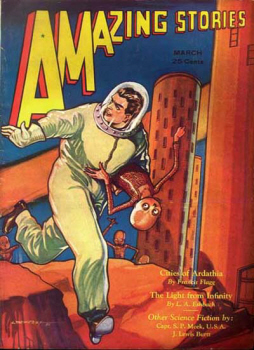 Newcomers to fantasy collecting may be unaware of the scope of pertinent and very useful information on the web, and particulary the resources assembled by members of the Yahoo Fictionmags Group. The terms “Big List,” “FMI,” “Galactic Central,” “Locus Index” and many others crop up without necessarily being understood. Fictionmags includes the authors of some of the most seminal and definitive reference works on magazine Science Fiction, Fantasy, and General Fiction. Not only is this material substantial and providing of answers to many questions, but it is also FREE to anyone conversant in accessing the internet.
Newcomers to fantasy collecting may be unaware of the scope of pertinent and very useful information on the web, and particulary the resources assembled by members of the Yahoo Fictionmags Group. The terms “Big List,” “FMI,” “Galactic Central,” “Locus Index” and many others crop up without necessarily being understood. Fictionmags includes the authors of some of the most seminal and definitive reference works on magazine Science Fiction, Fantasy, and General Fiction. Not only is this material substantial and providing of answers to many questions, but it is also FREE to anyone conversant in accessing the internet.
The major portal to this trove is www.philsp.com, the website of Fictionmags’ Phil Stephensen-Payne. This place is rather like a fantasy collector’s version of the Smithsonian. Just about everywhere you turn, there is something of interest. The site opens directly onto Phil SP’s “Galactic Central.” If you’ve ever wondered what a full run of Amazing Stories, Astounding/Analog, New Worlds or most any other SF prozine looks like, this is where you get to scroll through pages of color cover images arranged chronologically as illustrated checklists (including, for example, an up-to-date Black Gate checklist).
There are tens of thousands of these images from SF/F/H, Western, Crime, Adventure, Romance and general fiction titles. I’ve contributed images to this project from my own collection as have many others, and Phil has also gathered the content from many sources on the internet as well. There is also an accounting (The Big List) provided of all of the magazine titles pictured in Galactic Central showing where else they are more fully indexed. Huge as it is, this project is still not done, and Phil will probably have to come back in another lifetime to complete it.
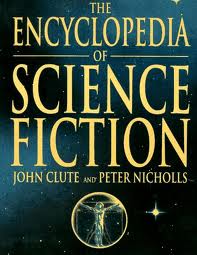 While one could spend days here, the site is host to a number of other valuable projects, the largest of which is the Fictionmags Index, aka “FMI” created and managed by Bill Contento.
While one could spend days here, the site is host to a number of other valuable projects, the largest of which is the Fictionmags Index, aka “FMI” created and managed by Bill Contento.
The FMI includes many thousands of Table of Contents from almost every major magazine that has ever published fiction. This database can be accessed by magazine title, story, and by author. If you want to learn what a given author has published in magazine fiction, apart from science fiction/fantasy/horror/mystery/crime magazines,(these are indexed separately) the FMI will provide information on appearances of that author, to the extent available in the database, by magazine title or story.
Likewise, one can search magazine titles in the database for the contents therein. As with Galactic Central, this is a major ongoing project, likely to be passed on to a succeeding generation.
The FMI does not attempt to duplicate indexes of fiction magazine material already completed or on-going elsewhere, such as The Science Fiction/Fantasy/& Weird Fiction Magazine Checklist created by chums Bill Contento and Steve Miller, and the Locus Index To Science Fiction created by Bill Contento and Fictionmagger-in-memorium Charles N. Brown, both works accessible from the FMI website.
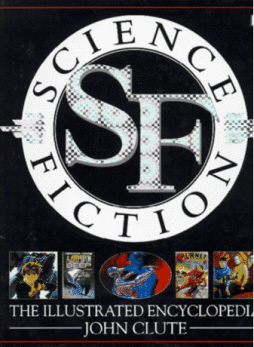 The Science Fiction, Fantasy, and Weird Fiction Magazine Checklist (1890-2007) is an abbreviated version of the same authors’ CD-ROM Science Fiction, Fantasy, & Weird Fiction Magazine Index (1890-2007). The checklist by itself lists all known SF/F/WF magazines by title. Clicking on any given title gives the months of appearance of the issues by year.
The Science Fiction, Fantasy, and Weird Fiction Magazine Checklist (1890-2007) is an abbreviated version of the same authors’ CD-ROM Science Fiction, Fantasy, & Weird Fiction Magazine Index (1890-2007). The checklist by itself lists all known SF/F/WF magazines by title. Clicking on any given title gives the months of appearance of the issues by year.
The Locus Index to Science Fiction (1984-1998) with annual updates through 2006 provides information on all magazines and books received by Locus Magazine between 1984 and 2006. (For those not familiar with it, Locus is the ‘go-to’ monthly magazine source for news and book announcements/reviews in the SF/F/H field.)
The Locus Index has a lot of the functionality of the FMI, permitting one to access magazine and book titles, authors, and TOC’s from the database.
The print works of Fictionmags’ John Clute, Mike Ashley and Barry Malzberg are also richly worth the effort:
The Encyclopedia of Science Fiction — 2d Edition, edited by John Clute and Peter Nicholls. This is one of the major works in the genre. The third edition, due sometime, will likely be on CD-ROM to accomodate all that is in the 2d edition as well as all that’s new in SF during the last 16 years. If it does appear as a CD-ROM then maybe the editors can bring back the illustrations that helped to characterize the first edition when it came out in 1977.
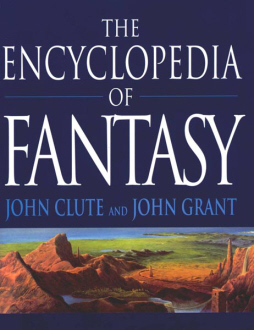 There is a companion piece of sorts to the 2d edition, by John, published by Dorling/Kindersly (DK) titled The Illustrated Encyclopedia of Science Fiction which, while nowhere near as extensive in entries as ESF-2d, has many informative illustrations accompanying the text. Used copies of ESF-2d are available on the web in both hardcover and softcover from both US and UK publishers, as is the Illustrated DK book, in the $20-$25 (US) range.
There is a companion piece of sorts to the 2d edition, by John, published by Dorling/Kindersly (DK) titled The Illustrated Encyclopedia of Science Fiction which, while nowhere near as extensive in entries as ESF-2d, has many informative illustrations accompanying the text. Used copies of ESF-2d are available on the web in both hardcover and softcover from both US and UK publishers, as is the Illustrated DK book, in the $20-$25 (US) range.
The Encyclopedia of Fantasy, edited by John Clute and John Grant. Here again a major contribution to the genre. EF seems to be a little more expensive than ESF-2d on the web, but that’s not to say decent copies for less are not to be had from diligent searching in used book haunts.
Back in the 1970’s, Mike Ashley authored a definitive four-volume History of the Science Fiction Magazine, covering the period 1926 to 1965. (A fifth volume was hinted at to bring the coverage to 1975, but it was not to be).
Between then and the present, a search of the net turns up an astonishing number of anthologies edited by Mike. Beginning in 2000, in between anthology projects, Mike (a charter member of Fictionmags) has been revisiting the History.
For collectors and researchers in the genre, the 4-volume history was an excellent tool and now it has been expanded into a major work in the genre, covering in much greater depth the period 1926 through 1970 and continuing towards the present.
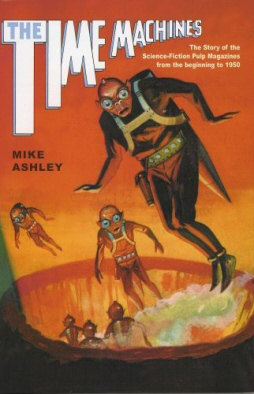 I have a complete collection of American SF prozines, and I can safely say that Mike’s present History of The Science Fiction Magazine has done more to introduce me to my own collection than my own efforts in assembling it. There is a ton of background and historical information in the three volumes published so far that goes well beyond the scope of indexes and checklists. The updated history so far:
I have a complete collection of American SF prozines, and I can safely say that Mike’s present History of The Science Fiction Magazine has done more to introduce me to my own collection than my own efforts in assembling it. There is a ton of background and historical information in the three volumes published so far that goes well beyond the scope of indexes and checklists. The updated history so far:
- The Time Machines — The History of The Science Fiction Magazine 1926-1950
- Transformations — The History of The Science Fiction Magazine 1951-1970
- Gateways To Forever — The History of The Science Fiction Magazine 1971-1980
The forthcoming fourth volume, tentatively titled “The Eternal Chronicles”, is hoped by its author to be the one to bring the history up to at least 2000, however this same goal had at one time been envisioned for the third volume.
Personally, I hope Mike keeps writing until he does bring the history up to at least today’s ‘present’, although he has been sanguine in the past about living long enough to do it.
Being a university press publications, there is so far not much of a discount off of list price on the first three volumes. The paperbound version is priced much lower than the hardbound version in both new and used on the net. Again, that’s not to say that copies might not occasionally turn up at very attractive prices.
 Not so long ago, copies of Science Fiction, Fantasy and Weird Fiction Magazines, by Mike Ashley and Marshall Tymm (Greenwood 1985), originally going for $85 (US) and advertised for more on the net, turned up in limited numbers for $15 or so. This latter work is also one of the andmark publications in the SF genre.
Not so long ago, copies of Science Fiction, Fantasy and Weird Fiction Magazines, by Mike Ashley and Marshall Tymm (Greenwood 1985), originally going for $85 (US) and advertised for more on the net, turned up in limited numbers for $15 or so. This latter work is also one of the andmark publications in the SF genre.
Barry Malzberg published a series of essays, comprising a very readable and informative and somewhat iconoclastic distillation of his experience in the Science Fiction field as a writer, editor, agent, and critic, that were collected in a 1982 book titled Engines of the Night.
Even though it was not a bestseller and did not radically alter mainstream’s perception of the SF field, it contained a lot of material that has managed to remain current.
In 2007 it resurfaced, with a whole new collection of essays in addition to the original group bringing the commentary up to roughly 2000, and retitled as a more comprehensive retrospective Breakfast In The Ruins: Science Fiction In The Last Millenium.
Although Barry seems to lament otherwise, both versions have a decent claim to the same shelf as Blish’s The Issue At Hand and Damon Knight’s In Search of Wonder.
The Science Fiction, Fantasy, and Weird Fiction Magazine Checklist, noted above as a freebie courtesy of the FMI website, was fathered by the much more functional (and purchase-able) CD-ROM, available from Locus Magazine, in the form of the actual “Index”.
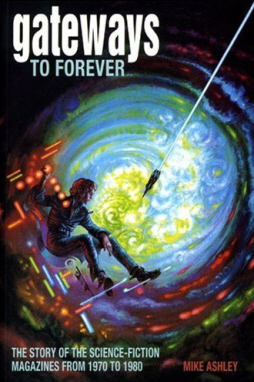 With the ‘Index’ version you have the functionality of the FMI index and of the Locus index, namely the ability to search out magazine material by author, story title, magazine title, and TOC’s.
With the ‘Index’ version you have the functionality of the FMI index and of the Locus index, namely the ability to search out magazine material by author, story title, magazine title, and TOC’s.
Although it focuses only on magazines, its coverage is far broader than the Locus index (1890-2007 inclusive vs 1984-1998, with individual years thereafter), and contains coverage not duplicated in the FMI.
On a recent project searching out the first appearances of certain authors in a particular magazine, I had the option of thumbing through my entire run of the magazine or going to the SF/F/WF Index. Going to the Index not only brought me quickly to each author’s works, but the CD also allowed me to have the works displayed from earliest to latest, saving me a considerable amount of time, and the magazines a certain amount of wear. For me, the $49 cost has been worth the money.
If you haven’t been familiar with any of the above, or just not been motivated to explore them, a trip to www.philsp.com will prove rewarding.
As for the books themselves, I’ve found browsing at dealer’s tables at conventions to be a great way of previewing books of interest. I write down the ISBN’s of the price-ier books that I think I might want and then go to the net and let Abebooks, B&N, Booksamillion, Alibris and Addall tell me if I can really afford them. No doubt other collectors who have have had experience with any of the works noted here can also attest to their usefulness.
George R. Morgan, a long-time collector, has built a complete run of all major and most minor U.S. science fiction magazines since 1926.